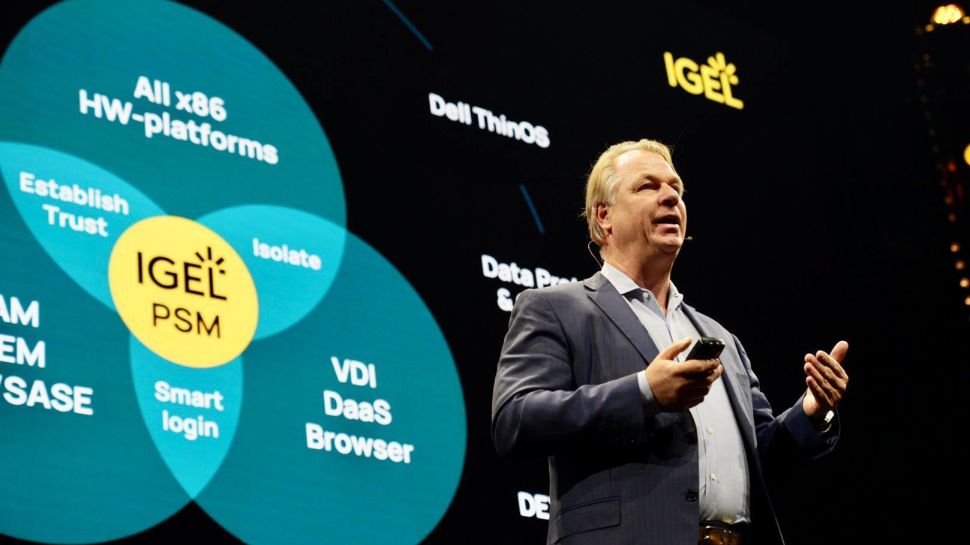IGEL: To be a sustainable business in 2024, we must look at IT as a whole
Security and sustainability can go hand-in-hand

At the recent IGEL Disrupt conference, the interconnected natures of security and sustainability emerged to create a promising outlook for businesses looking to stay ahead of the curve.
As organizations race to meet increasingly stringent environmental targets, the message from IGEL was clear – security and sustainability are no longer separate concerns, and combining both approaches can drive significant value for businesses.
Alongside discussions surrounding the recent CrowdStrike outage and other endpoint vulnerabilities, it quickly became apparent that adopting the right cybersecurity products can help enterprises make more efficient use of their hardware and energy resources.
Critically, protecting endpoints with secure operating systems proved instrumental to enabling long-term sustainability by reducing product refresh cycles, which will undoubtedly be welcome news not just on the sustainability front, but when it comes to budgets, too.
Blurring the lines between endpoint security and sustainability strategies
In an era of increasing cybersecurity threats and mounting pressure from governments and regulatory bodies such as the newly introduced Corporate Sustainability Reporting Directive driven by the European Union, organizations are being pushed to sustainable hardware optimization practices like reducing e-waste and resource consumption in order to remain compliant.
Another key message from the event was how secure operating systems can dramatically reduce product refresh cycles by prolonging the lifespan of devices, both reducing e-waste and lessening the financial burden of regular hardware upgrades.
Recent Intel research suggests the typical company upgrades its hardware every three to four years, but by tackling the cause of this frequency, companies can reduce it.
Are you a pro? Subscribe to our newsletter
Sign up to the TechRadar Pro newsletter to get all the top news, opinion, features and guidance your business needs to succeed!
The prospect of being able to run an alternative OS with SaaS, DaaS, VDI and secure enterprise browser functionality on older devices also tackles the looming Windows 11 transition, with many companies reluctant to upgrade from Windows 10 due to hardware limitations that would otherwise force them into buying new hardware.
As of August 2024, Windows 11 adoption had yet to reach one-third of all Windows installs, while Windows 10 deployment still stood at nearly two-thirds.
Another key benefit of prolonging device lifespan was the significant cost-saving potential. In the case of the company’s IGEL OS, total cost of ownership savings could be as high as 70-90%, driven by repurposing existing devices, reducing energy consumption and simplifying IT management through centralization and automation.
Moreover, by using an OS like IGEL’s, designed not just to be secure, but also lighter than typical enterprise operating systems, companies can use lower-performance hardware and even repurpose older devices for less critical workloads. In doing so, not only can companies reduce their carbon footprint by minimizing e-waste, but they can also expect to use less energy, to the tune of 22-49% less according to PX3 research cited during the conference.
At the event, the company highlighted Audi’s approach to deploying IGEL OS across its manufacturing process, whereby a series of computers, thin clients and displays became interconnected via the lightweight and secure software.
This example exemplifies how organizations in complex, high-tech industries can leverage these types of solutions to tackle both security and sustainability in one fell swoop, and serves as just a hint of how far the OS could reach across other industries.
Looking ahead, as more businesses begin to recognize the benefits of combining core IT principles such as security and sustainability, companies may once again be able to benefit from technology’s often failed promise of cost reductions.
If IGEL’s conference taught me just one thing, it’s that we need to stop looking at elements individually. In recent decades, solutions have been invented and refined to tackle all aspects of business, but for the next stage, we must simplify through amalgamation.
More from TechRadar Pro
- Here's the best malware removal tools around right now
- We've rounded up a list of the best Linux distro for privacy and security
- Security threats are more pressing than ever for business leaders, with cloud worries taking top spot
With several years’ experience freelancing in tech and automotive circles, Craig’s specific interests lie in technology that is designed to better our lives, including AI and ML, productivity aids, and smart fitness. He is also passionate about cars and the decarbonisation of personal transportation. As an avid bargain-hunter, you can be sure that any deal Craig finds is top value!
